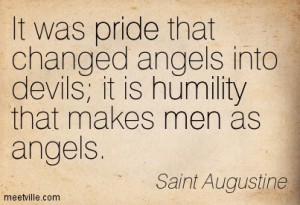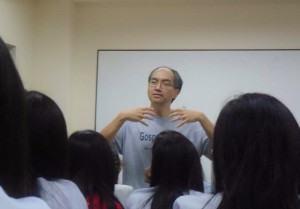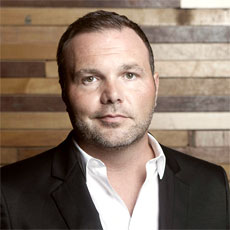Sensation over Sense
BK recently submitted an article about Trump and Evangelicals. And it made a lot of sense. But what doesn’t make sense is how much media coverage Trump is getting. He pretty much is the laughing stock of the nations. How is it that a beauty pageant organizer/reality tv star/real estate agent is running for US president? He has no political experience. And yet he has gotten so far in running. Like BK said it’s because he’s all about money and that’s what people value most. Continue reading →
Why Trump and Evangelicals Go Together
 Yesterday I got some exercise by walking 4 miles around Las Vegas. On the way back I saw one of the buildings in Donald Trump’s hotel empire. It dawned on me then why Trump has garnered support among the religious right-wing Evangelicals. This match seems so crazy at first. But it is not so crazy. Here are three reasons why I think the Trump-religious right match makes sense–painful, obvious sense.
Yesterday I got some exercise by walking 4 miles around Las Vegas. On the way back I saw one of the buildings in Donald Trump’s hotel empire. It dawned on me then why Trump has garnered support among the religious right-wing Evangelicals. This match seems so crazy at first. But it is not so crazy. Here are three reasons why I think the Trump-religious right match makes sense–painful, obvious sense.
Are UBF people and UBF churches humble?
 Do you belong to a proud or a humble church? Are you a proud or a humble person? How can we really tell if we are proud or humble? We might excuse our pride, since pride is a subtle and deceptive sin which surely inflicts us all in varying degrees. But excuses or not, God will hold us accountable and we will reap the fruit of either our pride or our humility. Continue reading →
Do you belong to a proud or a humble church? Are you a proud or a humble person? How can we really tell if we are proud or humble? We might excuse our pride, since pride is a subtle and deceptive sin which surely inflicts us all in varying degrees. But excuses or not, God will hold us accountable and we will reap the fruit of either our pride or our humility. Continue reading →
Why UBF Should Read Brian’s Books and Know His Story Well
 I ended 2014 with The Secret of Happiness and I begin 2015 with my friend Brian Karcher.
I ended 2014 with The Secret of Happiness and I begin 2015 with my friend Brian Karcher.
Brian keeps UBF honest. Forests reviewed Brian’s first book and says, “I encourage everyone to buy and read Brian’s book. It contains much more than I have mentioned. I recently spoke to a UBF missionary from Chicago who said that Brian is good for UBF because he ‘keeps us honest.’” (Book Review: Rest Unleashed.) Continue reading →
I Don’t Trust Dr. Ben
 Highly autonomous. As a predominantly autonomously driven introvert and agent provocateur, the opinion of others likely affects me far less than it might affect others. I believe that this is how God wired me. In contrast, more socially driven extroverts might be affected more by the opinion of others, and by whether or not others like or dislike them. I hope I am not caricaturing any social butterflies (who are really fun people), but only making rather broad general statements.
Highly autonomous. As a predominantly autonomously driven introvert and agent provocateur, the opinion of others likely affects me far less than it might affect others. I believe that this is how God wired me. In contrast, more socially driven extroverts might be affected more by the opinion of others, and by whether or not others like or dislike them. I hope I am not caricaturing any social butterflies (who are really fun people), but only making rather broad general statements.
If you say NO, it’s DONE. To put it bluntly I might even declare–at least to myself, but not to others (I don’t want to come across as being disrespectful or uncaring or rude!)–that I could care less whether or not others like, dislike, approve or disapprove of me. In fact, I am highly motivated and encouraged to do the very opposite of what others desire or expect of me. Thus, I often tell others with a big warm cheeky smile, “If you tell me NO, it’s DONE! If you say Stop, I Go.” So, my wife has learned to use reverse psychology on me. What a wise woman she is! Continue reading →
What Samuel Lee Taught
 After his passing in 2002, Lee is credited with 8 to 12 legacies that are being used as “core values” to define UBF throughout the world. But I’m wondering if these distinctives are the best descriptives of his legacy and teachings.
After his passing in 2002, Lee is credited with 8 to 12 legacies that are being used as “core values” to define UBF throughout the world. But I’m wondering if these distinctives are the best descriptives of his legacy and teachings.
From 1980 (when I became a Christian and joined Chicago UBF) to 2002 (when Lee died), I witnessed firsthand what Lee said and taught. For the last 22 years of his life I listened to Lee’s preaching in Chicago UBF, and heard his prayer topics and announcements every week. He would be the final word at the Mon fellowship leader’s meeting, the Tue elder’s meeting, the Fri student leader’s meeting, on Sat when we met for prayer for the Sunday worship service, and also on Sun after the sermon.
There have been many negative accounts about Lee (which are credible accounts from credible people). But there are also Lee’s positive teachings, which I regard as the gist of his primary teachings and main emphasis for 22 years under his leadership. Many might insist that he did not practice what he preached. Nonetheless, this is what he said and emphasized repeatedly for the last 22 years of his life. Continue reading →
Your food sucks!
 How do you help a group of people whose lives are intertwined with a failing organization? How do you get through to owners who are in denial about the state of their organization? Robert Irvine’s TV show does just that, over and over again. Recently, in May 2014, the show “Restaurant Impossible” aired its 100th episode. I’ve watched all of the shows up to Season 7, so I still have some catching up to do. To put it mildly, I have been enthralled by this show and by the TV personality, Robert Irvine. The premise of the show is that restaurant owners contact the Food Network and apply to get help from Robert for their restaurant in danger of closing. Robert goes into the restaurant and has a total of 36 hours and $10,000 dollars to save the restaurant. I was stunned by the process and how Irvine goes about this restaurant-saving work. Could there be implications here for the church? I think so.
How do you help a group of people whose lives are intertwined with a failing organization? How do you get through to owners who are in denial about the state of their organization? Robert Irvine’s TV show does just that, over and over again. Recently, in May 2014, the show “Restaurant Impossible” aired its 100th episode. I’ve watched all of the shows up to Season 7, so I still have some catching up to do. To put it mildly, I have been enthralled by this show and by the TV personality, Robert Irvine. The premise of the show is that restaurant owners contact the Food Network and apply to get help from Robert for their restaurant in danger of closing. Robert goes into the restaurant and has a total of 36 hours and $10,000 dollars to save the restaurant. I was stunned by the process and how Irvine goes about this restaurant-saving work. Could there be implications here for the church? I think so.
Mark Driscoll Removed from Acts 29
 What we can learn from Mark Driscoll’s removal from Acts 29?
What we can learn from Mark Driscoll’s removal from Acts 29?
The big news in Christendom today. Acts 29, a national church planting group with 500 churches cofounded by Mark Driscoll, has removed Driscoll, the senior pastor at Mars Hill Church in Seattle and the church from membership, with seven board members urging in a letter that Driscoll “step down” from ministry and “seek help.” The letter is here.
5,000 church members in 8 years. In the mid-1990s, at age 25 Driscoll started a church in his house in Seattle with a dozen people. In 8 years, his church grew to 5,000 members when he was only 33 years old. Today, his network of five local churches boasts 18,000 members. He founded Acts 29, a church planting network that grew to 500 churches, and a Bible seminary. He is said to read one book a day. His sermons are downloaded millions of times by Christians throughout the English speaking world. He has authored many Christian books, including the popular and controversial Real Marriage. He is famous throughout the world with invitations to preach and teach in churches from many countries. Continue reading →
How Great Leaders Inspire Action
 Right now, I’m on the road. This summer I visited three different countries over the span of 6 weeks. It is tiring living out of a suitcase, but the good thing is that I have a lot of alone time. Travelling alone is a time of privilege to examine one’s life. If you have the financial means, I highly recommend it. Basically, I’ve been reading, thinking a lot and also spending a lot of my time watching TED talks. I wanted to share one in particular about leadership because Dr. Ben asked me to and because I feel like its message is applicable to anyone who wants to live a life that challenges the status quo. It is called “How great leaders inspire action” by Simon Sinek.
Right now, I’m on the road. This summer I visited three different countries over the span of 6 weeks. It is tiring living out of a suitcase, but the good thing is that I have a lot of alone time. Travelling alone is a time of privilege to examine one’s life. If you have the financial means, I highly recommend it. Basically, I’ve been reading, thinking a lot and also spending a lot of my time watching TED talks. I wanted to share one in particular about leadership because Dr. Ben asked me to and because I feel like its message is applicable to anyone who wants to live a life that challenges the status quo. It is called “How great leaders inspire action” by Simon Sinek.
10 Traits of Creative People
 When I saw this list on Facebook, I was surprised that it described me, though I never thought of myself as creative. Then I chucked to myself, thinking that people will really be quite annoyed by anyone with these traits. See if you have them. Surprisingly (or not), Jesus might actually be the most creative person of all.
When I saw this list on Facebook, I was surprised that it described me, though I never thought of myself as creative. Then I chucked to myself, thinking that people will really be quite annoyed by anyone with these traits. See if you have them. Surprisingly (or not), Jesus might actually be the most creative person of all.
1. Easily bored. I’ve said often that a great sin of Christians or the church is being boring (and predictable), because Jesus was never boring! When told that they are committing the sin of killing people with boredom, they say that the complainers are unspiritual and sinful. But in the gospels, it is the unspiritual and sinful that are attracted to Jesus! The ones who disliked Jesus were the boring people among the religious leaders.


Last 30 Comments